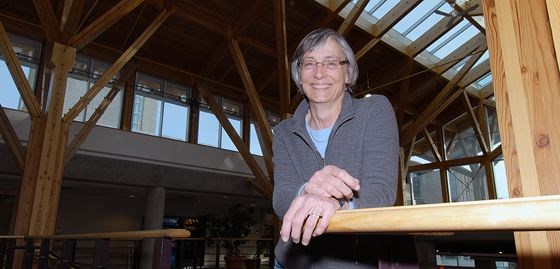If and when the UNBC Faculty Association settles a new contract this year, ecosystem science and management professor Kathy Lewis is due for a raise.
Considering her work as a pine-beetle researcher helped Canada win an international court arbitration softwood trade ruling that might have left B.C. foresters on the hook for a $380 million penalty, whatever wage settlement Lewis achieves is money well spent.
In recognition of her work in examining the pine-beetle epidemic and how it has affected northern B.C. forest over the past decade, Lewis was presented the academic of the year award by the Confederation of University Faculty Associations of B.C. at a ceremony Wednesday in Vancouver.
"That wasn't just me, there were lots of expert witnesses there, but it was really rewarding that some of the research we've been doing actually had a role to play in that dispute," said Lewis.
"We were trying to quantify the change in wood quantity and quantity over time after the trees had been killed by pine beetles and that was important to help both government and industry plan salvage logging to try to recover the value. We had done most of that at the time the most recent softwood lumber dispute came along."
Lewis, 53, was approached by the B.C. Ministry of Forests legal team to reveal the findings of her research for them to present in a court case in London, England. U.S. softwood lumber producers had claimed B.C. was overestimating the amount of beetle-killed trees rendered unsuitable for dimension lumber.
The July 2012 decision of a tribunal of the London Court of International Arbitration panel ruled that Canada's market-based timber pricing policies did not circumvent its Softwood Lumber Agreement with the United States. The case was dismissed and B.C. Interior lumber producers were spared a huge penalty.
"We started our research in 2005 and we were sampling trees that had been killed by pine beetle using tree ring analysis to determine the exact year when they died, and that was a new approach to some of these other studies of wood deterioration," said Lewis.
"In destructive analysis we felled a tree and bucked it into many small pieces to measure the amount of cracks [checks] and the moisture contact of the wood and how deep the blue stain was and whether there were wood borers and other kinds of damage."
Lewis is now focusing her research on determining which beetle-killed trees to predict which will fall down soonest. That information could help tree-harvesting companies determine where to concentrate their logging efforts and help reduce the mobility hazards felled trees cause large animals like moose.
"The fibre doesn't go anywhere as long as it remains standing,"said Lewis. "But if it hits the ground it can absorb moisture and that allows decay fungi and wood-borers to get going, and they actually consume the fibre.
"There's a lot of operability and cost factors involved in how long those trees are useful for something. If you're trying to make lumber you want to export to Japan, for example, your shelf life is only months, if not weeks [after a tree dies], because they don't like the blue stain. If you're trying to make dimension lumber, depending on the size of the tree -- down in Quesnel they were using trees 20 years after the 1983 outbreak and the reason they were able to make a profit is they were also harvesting green trees. If you're making pulp, you probably have a shelf life of probably decades."
Lewis's future studies at UNBC will examine foliar forest diseases that emerge as a result of climate change.
Chris Oppio, also a professor in the UNBC department Lewis chairs, was named CUFABC academic of the year last year and was on hand Wednesday in Vancouver to see Lewis receive her award.



